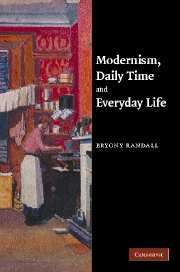Book contents
- Frontmatter
- Contents
- Acknowledgements
- List of abbreviations
- Introduction: dailiness
- Chapter 1 The contemporary context: Henri Bergson and William James
- Chapter 2 Dailiness in Dorothy Richardson's Pilgrimage
- Chapter 3 Re-creation, work and the everyday in Gertrude Stein
- Chapter 4 War-days: H.D., time and the First World War
- Chapter 5 Reading, writing and thinking: a Woolfian daily life
- Afterword
- Notes
- Bibliography
- Index
Afterword
Published online by Cambridge University Press: 22 September 2009
- Frontmatter
- Contents
- Acknowledgements
- List of abbreviations
- Introduction: dailiness
- Chapter 1 The contemporary context: Henri Bergson and William James
- Chapter 2 Dailiness in Dorothy Richardson's Pilgrimage
- Chapter 3 Re-creation, work and the everyday in Gertrude Stein
- Chapter 4 War-days: H.D., time and the First World War
- Chapter 5 Reading, writing and thinking: a Woolfian daily life
- Afterword
- Notes
- Bibliography
- Index
Summary
Nothing happens; this is the everyday. But what is the meaning of this stationary movement? At what level is this ‘nothing happens’ situated? For whom does ‘nothing happen’ if, for me, something is necessarily always happening? In other words, what corresponds to the ‘Who?’ of the everyday? And why in this ‘nothing happens’ is there at the same time the affirmation that something essential would be allowed to go on?
Blanchot's question ‘what corresponds to the “Who?” of the everyday?’ has been, implicitly, central to this exploration of dailiness in modernist literature. The rhetorical force of Blanchot's question is revealed when we recall how the texts addressed have exposed notions of the everyday as unmarked, unremarkable, where ‘nothing happens’, as deeply flawed. Such notions risk, to use Woolf's observation about the traditional memoir in terms precisely resonant with Blanchot's, ‘leav[ing] out the person to whom things happened’. To return to the different strands of thought on the everyday adumbrated in my Introduction, the phenomenological attempt to parenthesise the everyday as a region in which ‘nothing happens’, and thus, by definition, I, you, we do not participate, ‘leaves out the person to whom things happened’. This construction of the everyday hollows it out into an empty category, uninhabited, uninhabitable and inhuman. These modernist texts have shown emphatically that there is indeed no-one for whom nothing happens, and what happens to everyone is the everyday.
- Type
- Chapter
- Information
- Modernism, Daily Time and Everyday Life , pp. 185 - 192Publisher: Cambridge University PressPrint publication year: 2007



